Maurice moved by ‘full circle’ mission
In April, 93-year-old Maurice Fremder – who lost all his family in the Holocaust and fought in Israel's War of Independence – experienced the trip of a lifetime with his son Michael on UIA Australia's Yom Ha'atzmaut 75th Anniversary Israel Mission. He told Shane Desiatnik that seeing what Israel has built and become made him feel 10 feet tall.
At 93, Maurice Fremder was the oldest member of UIA Australia’s milestone Yom Ha’atzmaut 75th Anniversary Israel Mission in April – by a long way – and most probably, the oldest of the UIA groups from North America, South America and Europe too.
Despite the immersive 10-day trip being packed with daily outings to UIA-funded projects right across the Jewish state, seminars on most evenings and rollicking Yom Ha’atzmaut festivities that got thousands of people up and dancing – including Maurice – his son Michael, who accompanied him, said Maurice surprised all 36 members of the group with his energy and enthusiasm.
“Dad walked further than quite a few of the others, let me tell you!” Michael said with a chuckle.
“It’s his koach (inner strength) …that’s what got him through life and why he is here today.”
What Maurice went through in his childhood during the Holocaust and particularly as an 18-year-old “machal” (a volunteer army recruit from overseas in Israel’s War of Independence), made this UIA mission even more meaningful, making him feel he had come “full circle”.
Born in Wolomin, Poland, in August 1930, Maurice was nine when he watched the burning of the town’s synagogue.
He was still shy of 10 when he fled across the border to Russian-controlled territory with his father and two siblings and a plan for his remaining siblings and his mother to follow suit failed.
Tragically, Maurice was the only survivor of the Holocaust in his immediate family.
After a few post-war years of living in various European countries and six months in Brazil staying with distant relatives on a temporary visa, he heard the news that Israel had become an independent state.
“After all I’d been through, I felt I must go there and be with my people,” Maurice recalled, “so I joined the Israeli army immediately, right off the boat.
“I was suddenly in a war, but we didn’t think much about it.
“I was a machal, with boys from America and England and while I couldn’t understand a word they said, it didn’t take long for us to unite, as we knew exactly what we were there for.”
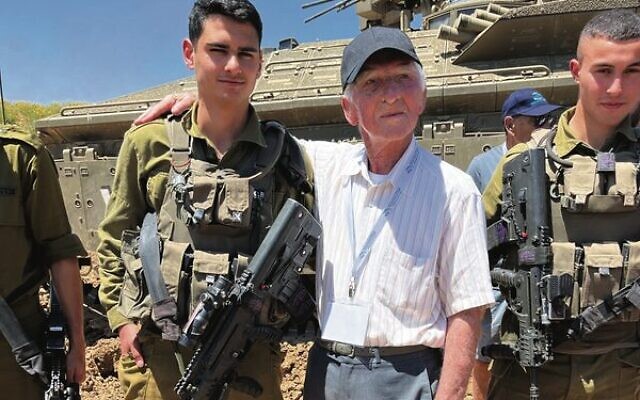
His memories include the fear of being shot at any time and a constant shortage of equipment.
“In 1948, America was not providing weapons to us, so I remember my pistol had a swastika on it, because it had come from Czechoslovakia,” Maurice said.
“We had to use what we had and practise shooting without bullets, because they were in short supply.
“We took Bethlehem by 4am one day, after three busloads of soldiers were driven on winding roads at night, with the headlights turned off.
“And who was it that came to shake hands with us? … Israeli president Chaim Weizmann.
“We lost about 6000 men in that war and how many became invalids, I don’t know, but Israel survived.”
Maurice left the army at war’s end and stayed in Israel for two more years, but faced financial hardship and decided to move abroad, eventually making it to Melbourne by ship in 1951, before relocating to Sydney the next year.
“After the army it wasn’t an easy life because there were almost no jobs and very little food available and it was all by coupons, but I did find some building work.
“I went into a grocery shop and the lady at the counter said I looked like her son, who was an officer in the army who got killed four months before, so she gave me two boiled eggs and a slice of bread each day, which I was grateful for.”
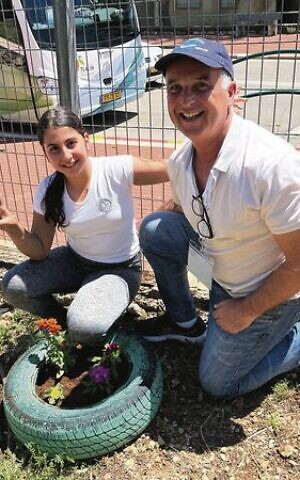
Fast forward almost three-quarters of a century and Maurice has enjoyed all that life in Australia offers, becoming a father of two, a grandfather of two and a great-grandfather of one (so far).
But the last time he’d visited Israel was in 2010 and when the COVID pandemic cruelled his plan to travel there one more time, with Michael, both wondered if another opportunity would ever be possible.
Then the annual donor to UIA Australia, for more than six decades, received some good news.
Michael, also a regular UIA donor, heard about the 75th Yom Ha’atzmaut mission when phoned directly by the charity’s NSW branch.
“It worked out brilliantly for us,” Michael said, “because I wanted this trip to be extra meaningful and this mission was outstanding.
“My brother, Les, also flew to Israel with us and joined us at times.
“The most interesting aspect for me was to watch Dad react and reflect on the Israel he was seeing in 2023, compared to 1948.
“Dad gave a little speech to the group as we were heading to Jerusalem after visiting the Haganah Memorial Museum, that I think summed that up well.
“He told them: ‘Seeing what I’ve seen now, fills my heart with such joy.’”
Maurice said the mission made him feel “10 feet tall, about how much Israel has built and changed for the better, because when I had travelled from Haifa to Tel Aviv back in 1948, there was nothing”.
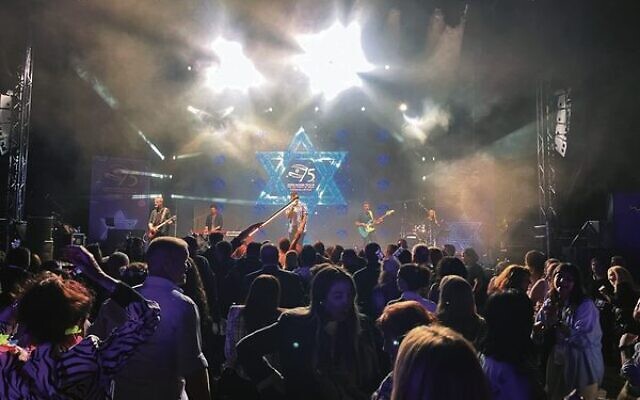
“This time I saw farmland where there was just sand and many thriving cities that can match any around the world. What a transformation!
“And it was the type of trip where you could actually meet the people that UIA helps.
“That was important to me, as the reason why we are so Zionistic is because we lost our family in the Holocaust and that’s the biggest tragedy for any person.
“No countries opened the gates for us [the Jewish people] and this is the one grudge I still have today.”
Michael said that some of the most moving moments were meeting families – including Ukrainians – being supported at several immigration absorption centres and talking with disadvantaged children and their teachers at Hadassah Neurim and Ramat Hadassah Youth Villages and Youth Futures Program participants.
“Child refugees in wartime Europe, like Dad, didn’t get the help they needed at that time, whereas in Israel in these ulpans, absorption centres for new immigrants and the youth villages, the people in need are actually brought in and helped,” Michael said.
“So I think between my Dad’s childhood situation and this, it’s literally a 180 degree turn.
“I saw Dad go and speak to quite a few of the kids at the youth villages, including a girl who was 10 or 11.
“Afterwards, a staff member told us that when she first came there, she had been so traumatised by what had happened in her family home, that she couldn’t speak.
“But with support and care, they’ve got her back to the point where she is participating in society again.
“They’re doing really wonderful work at these centres.”
Visiting the Machal Monument, a former Hezbollah tunnel near the Lebanon border and unexpectedly meeting an IDF platoon on patrol duty near the Gaza border, were also experiences that left deep impressions.
“What struck me was that the platoon commander was only 21 and his crew members in the tanks were all 19 and how they’re fighting for their country at that age,” Michael said.
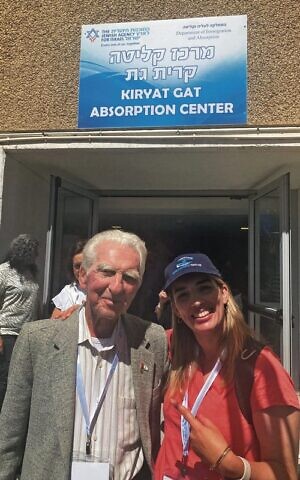
“Dad met many young soldiers and two in particular just couldn’t believe they were standing next to an original member of the 1948 army boys.
“They were just so thrilled to meet Dad.”
With a personal interest in agri-tech, Michael said he was fascinated to visit several cutting edge kibbutzim, from the Negev to the country’s north.
“One we went to was Nefatim (within Kibbutz Magal] – the kibbutz which designed the drip irrigation system.
“As the saying goes, necessity is the mother of invention and they are now churning out $1.6 billion per year from that kibbutz.”
The mission’s guest speakers included leading Palestinian affairs reporter Ohad Hemo, senior Israeli politics journalists Tal Schneider (Times of Israel) and Amit Segal (Channel 12 News) and former Israeli ambassador to Australia Yuval Rotem.
While some lectures were inspiring, Michael said, “One talk was about the secular-Charedi divide in Israel and that really brought us down.”
Maurice added, “What I don’t like about what’s going on in Israeli politics is how they tear each other to pieces.”
“Why did the Romans succeed in destroying ancient Israel … because the Jews in those days didn’t get on either.
“But I do think this can be solved by the new generation that is attending high school today.
“I remain hopeful about that, but unity is the key.”
And with a 75th anniversary theme, Maurice and Michael said the mission’s itinerary for Yom Hazikaron and for Yom Ha’atzmaut certainly lived up to the hype.
“On the night of April 24 [erev Yom Hazikaron], we went to a memorial service in Latrun, attended by thousands of people from all the UIA tour groups present from around the world,” Michael said.
“During the service, the stories of half a dozen lone soldiers were told and their family members were there.
“It was sad, as it should be, but very good to experience.
“The next afternoon, at Zappa Park at HaYarkon, everything was quite subdued, with prayers and quiet reflections, until after 8pm, when suddenly the place just went off with Yom Ha’atzmaut celebrations, bands, music and a huge party attended by thousands.
“We were from different continents, but everybody was dancing the hora together, as Jews in Israel.
“It was fabulous and the best day, exactly for that reason.
“And you had a good time there too, right Dad?”
Maurice answered, “Oh yes, there was a lot of happiness out there … what a celebration!”
The next UIA Australia Israel missions will be in mid-October – one general and one medical-focused. Information about these missions can be found at uiaaustralia.org.au/missions, or by contacting the UIA office in your state.

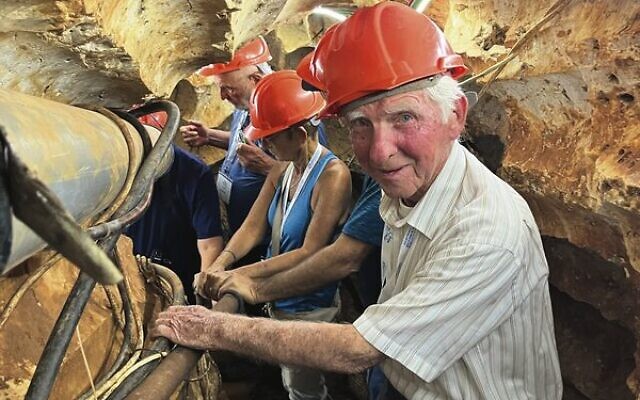
comments